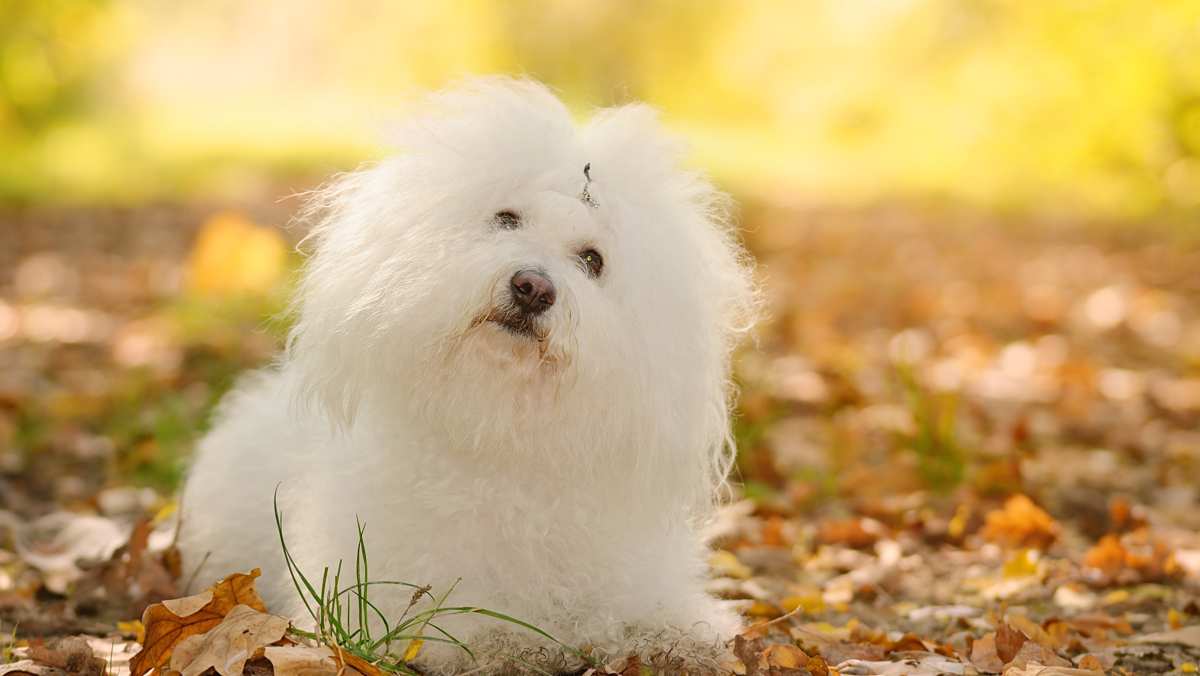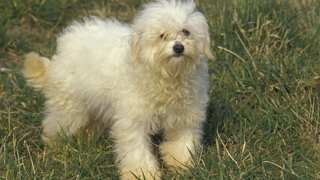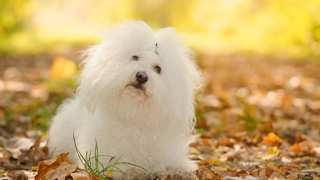Bichon Bolognese
Bolo Dog
Bolo Puppy
Bolognese Dog
Bolognese Puppy
Bolognese Toy Dog
Bologneser
Botoli Dog
Botoli Puppy
Bottolo Dog
Bottolo Puppy
The Bolognese, also called the Bichon Bolognese, is a toy-sized dog that is a member of the Bichon family of dog breeds. Believed to have originated in Italy centuries ago, this somewhat rare breed is playful but reserved, and can be quite temperamental if not given a lot of attention. These little dogs – which exist only in solid white – may require some training to instill proper behavior, but can be a great companion to seniors and other people willing to return the love it freely gives.
The Bolognese, a member of the Toy group of breeds, is the very definition of a personal companion dog. These little animals have existed as lapdogs for centuries, and are good pets for singles, seniors, and anyone willing to provide them with the love and attention they need.
A few Bolognese dog facts: they're small-sized (average weight is 11 pounds, and average height is 10 inches), with long-haired, single-layered, fluffy coats that only exist in white. They have a relatively long lifespan of 12-15 years, and will require a good bit of grooming and other maintenance. Here are some good (and not so good) qualities of the Bolognese:
PROS:
- Extremely affectionate
- Intelligent
- Sheds minimally; good for allergy sufferers
- Normally good-natured and playful
- Socializes pretty well with children and other pets
- Good health
- Great for apartment life
- Fantastic "snuggle buddy"
- Responds fairly well to training
- Extremely willing to please
CONS:
- Extremely sensitive and needy
- Frequent grooming required
- Often prone to separation anxiety
- Will need a lot of housetraining
- Can develop Small Dog Syndrome
- Difficult to find and obtain, and therefore expensive
- Will need lots of socialization with people and other animals
- Generally high-maintenance
Purebred
12 - 15 yrs.
9 - 12 in.
8 - 14 lbs
OverallFamily FriendlyChild FriendlyPet FriendlyStranger Friendly
Easy to GroomEnergy LevelExercise NeedsHealthShedding Amount
Barks / HowlsEasy to TrainGuard DogPlayfulnessWatch Dog
Apartment DogCan be AloneGood for Busy OwnersGood for New OwnersIntelligence
Bolognese Breed Description
A small-sized breed. Weight is 8-14 pounds, and height is 9-12 inches.
A Bolognese is an intelligent, reserved, loyal breed that requires a good deal of attention from its owners. While fairly good with children and other pets, this breed can be needy and shy, and will demand a lot of love and affection – or else it won't hesitate to let its owners know it's around. Bolognese are recommended as companions for senior citizens, or for anyone willing to give them plenty of tender love and care.
These dogs are fairly high-maintenance, and will need a lot of grooming.
The Bolognese, along with other Bichon breeds, has been around for centuries. While the most popular theory is that this breed was developed in the Italian city of Bologna in the 12th or 13th century – hence the breed's name – some historians argue that Bichon breeds existed in ancient civilizations as early as 1500 B.C., and that an early variant of the Bolognese was one of them. Whatever the case, these "tiny white dogs" became popular among the Italian aristocracy during the 1200s; through the centuries, they became popular as gifts from royal courts in Italy, Belgium, Spain, and elsewhere, and since the 1500s numerous Bolognese have been depicted with their aristocratic owners in paintings by renowned artists.
With the weakening of royal power in Europe in the 20th century came a decline in the number of Bolognese dogs; by the late 1900s, the breed was on the verge of extinction. Though Bolognese have revived a bit in number, today the breed is moderately rare, even in its native Italy. Though not officially recognized by the AKC, in 1999 the organization added the Bolognese to its Foundation Stock Service.
The Bolognese's coat is single-layered (i.e., no undercoat), long-haired, and fluffy. This breed's body is generally equal in length and height. The head is oval, with a short muzzle and a black nose; the eyes are large, round, and dark brown in color; the ears are high-set, long, and hanging. The chest is broad, the legs are short and straight, and the tail is high-set, of medium length, and curved, often carried over the back.
The images below represent the coat colors and patterns associated with Bolognese.
The Bolognese sees little variation in physical structure within individual dogs of the breed. Some "designer dog" breeders will crossbreed different but similar Bichon types--the Bichon Frise or the Havanese, for example, in addition to the Bolognese--to get their desired traits, but these hybrids are not considered variants of the Bolognese or any other Bichon breed.
Bolognese coats are fairly consistent: single-layered, long-haired, and white in color. Black and white, or brown, coats are possible but extremely rare.
In regards to size: the Bolognese is a toy dog, without question. That said, the designer dog breeders, in an attempt to develop the smallest dogs possible, will often use selective breeding techniques--breeding successive generations of smaller and smaller dogs, in other words--to develop what they call "Teacup Bolognese" dogs. These animals are indeed tiny--some as small as 4 pounds in weight and 6 inches in height--but they are still purebred Bolognese, and are likewise not considered sub-types of the breed.
Loyal, intelligent, easygoing, and reserved, the Bolognese is a playful but serious little dog that forms a close bond to its owners. This breed enjoys energetic playtime while outdoors, but loves to curl up in its owner's lap once it's inside. A Bolognese is also very sensitive, and often takes cues from its humans as to what mood it "should" be in. Though the typical Bolognese is generally happy, these dogs can be quite needy, and may suffer from separation anxiety if not given enough attention; a Bolognese may howl and exhibit destructive behavior if ignored. They may also show symptoms of Small Dog Syndrome, in which the dog may be overly bossy, aggressive, and anxious, if not disciplined properly (when the dog is a puppy, if possible). Experts suggest using gentle but consistent discipline techniques, and plenty of positive reinforcement, when a Bolognese is young to instill proper behavior. The Bolognese, like other Bichon breeds, can also prove difficult to housetrain.
This breed responds well to training, though, and while not overly yappy, is inquisitive and intelligent enough to make it a good watchdog.
This breed is considered fairly high-maintenance. A good bit of training will be required, particularly in the areas of housetraining and proper behavior; a lot of grooming will be necessary, but exercise needs are only moderate.
A Bolognese sheds only minimally, but will need frequent brushing (at least three or four times per week, if not daily) to keep its coat fluffy and tangle-free. Most Bolognese owners bathe their dogs monthly, and often use a whitening shampoo to keep the dog's coat a gleaming white. Some also use clippers, or take their dogs to professional groomers, to maintain the fur at their desired length.
Playtime – whether indoors or in a fenced yard – is great for a Bolognese. Professional dog trainers also recommend engaging in a regular walking regimen (once a day, if not more) for this breed, always with a leash; this, they say, will instill proper discipline, and teach the Bolognese some much-needed obedience.
Due to its small size and moderate energy level, this breed will do well in apartments as well as houses.
Life expectancy is 12-15 years. A Bolognese is a moderately healthy breed, but may suffer from hip dysplasia and/or Legg-Calve-Perthes disease, a condition that causes the head of the hip bone to shrink; while not fatal, Legg-Calve-Perthes will require surgery. Some Bolognese are also prone to tear stains, which are discolorations beneath the eyes due to chronic eye irritation; experts recommend frequent wiping around the affected eye(s) with a damp cloth, or a visit to a veterinarian.
Bolognese Health Concerns
Below are potential health concerns associated with Bolognese.
Hip dysplasia
Legg-Calve-Perthes disease
Chronic eye irritation



